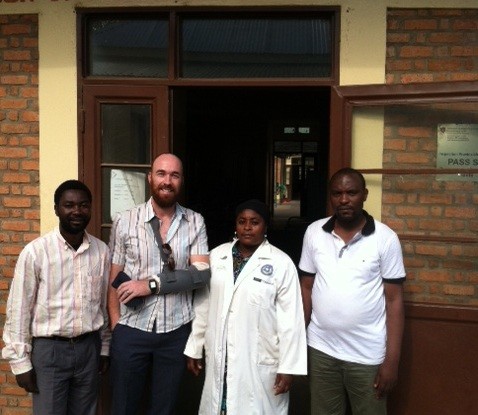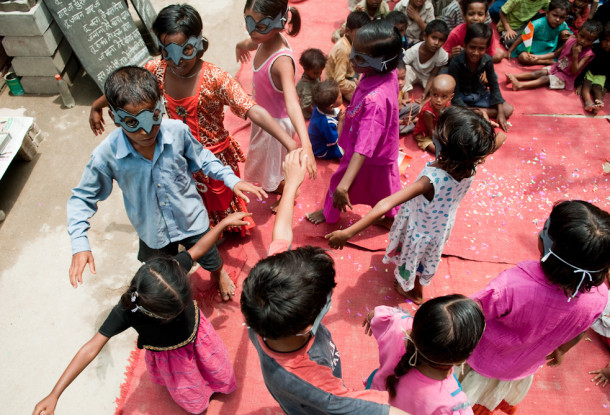Innovation Summary
 The region where the project will take place is the home of a low-income population living in slums or deprived houses and exposed to a number of risk factors. These conditions create an unfavorable context for the development and mental health of children and their mothers. Pregnant youth from low socio-economic background are exposed to several risk factors such as urban, domestic and intra-marital violence, single-parent families, low family and social support, use of tobacco, alcohol and drugs, etc.
The region where the project will take place is the home of a low-income population living in slums or deprived houses and exposed to a number of risk factors. These conditions create an unfavorable context for the development and mental health of children and their mothers. Pregnant youth from low socio-economic background are exposed to several risk factors such as urban, domestic and intra-marital violence, single-parent families, low family and social support, use of tobacco, alcohol and drugs, etc.
Through a randomized controlled trial, the project tests for the first time in Latin America a novel, intensive nurse home visitation program for first-time pregnant youth living in poor urban areas from between 8 and 16 weeks pregnancy until the baby is six-months old. The program is inspired by two, well-studied interventions (Nurse Family Partnership and Minding the Baby) but was tailored to the socio-cultural aspects and to the health system organization of a developing country. The project further innovates by focusing on the biological underpinnings of the positive environmental stimuli promoted by the intervention by measuring repeatedly neurophysiological indicators of brain maturation, which has not been done previously in the field.
Gallery
Impact
Expected Impact:
- 30 first-time pregnant youth will receive the intervention.
- Intervention group will have a 50% reduction of exposure rate to toxic stress.
- The intervention will represent a 30% gain in electrophysiological measures of positive brain development, such as a reduced theta activity, increased in alpha and beta activity, higher coherence between anterior and posterior sites and left/right hemispheres.
“ To promote brain development and prevent the occurrence of mental disorders, we believe we need to start very early in life by promoting maternal care and reducing exposure to toxic stress”.
--Guilherme V. Polanczyk, Project Lead
Innovation
In an on-going birth cohort conducted by our team in the region where the project will take place, a teenage pregnancy rate of 25%, a high percentage of unplanned pregnancies (20%), domestic violence (24%), depression (29%) and smoking (17%) during pregnancy, and low maternal education and single-parent families were detected [1]. In addition, the social support network in this region is reduced, and there is a lack in both quantity and quality of schools, daycares, leisure areas, and security services. The Brazilian health system is based on the Family Health Strategy (ESF), but due to the high number of people in the system, it is difficult for the family health teams to respond to all the needs of the population and they are often restricted to providing acute care for severe cases [2]. The aim of this project is to structure an intervention to fill the technological gap of specialized care by creating a favorable environment for healthy mental and physical child development and to improve the health of mothers that live in precarious social conditions.
The innovation targets first-time pregnant youth between the ages of 14 and 19 years-old who are between 8 and 16 weeks pregnant and aims to demonstrate the following:
1) Intensive nurse home visitation program can be effectively delivered to more than 80% of enrolled pregnant youth and subsequently to their infants in poor urban communities in Brazil.
2) The intervention will result in the reduction of maternal depressive symptoms and improvement in the quality of caregiver environment to participants in the treatment arm compared to care as usual.
3) The intervention will produce a reduction in theta activity and increase in alpha and beta activity, as well as higher EEG coherence (between anterior and posterior sites and left/right hemisphere) among infants in the treatment arm compared to care as usual, measured at 2 and 6 months of life.
4) The intervention will also demonstrate improvement in infant’s cognitive development indicators.
Collaboration:
Funders:
- Saving Brains Partners
Key Partners:
- Charles Nelson, Harvard University, USA
- Naercio Aquino Menezes Filho, Insper Instituto de Ensino e Pesquisa – Brazil
Implementation:
Expected Challenges:
- Nurses may face challenges visiting families in areas of high risk.
- Risk of high attrition rates
Continuation
Investigators are working closely with key stakeholders in Brazil to pave the way for scaling up the program across the country.
Evaluation Methods
Delivery of intervention will be assessed in terms of number of visits conducted for each family and number of families successfully followed during the visitation period. The satisfaction with the program according to families, health teams, and nurses will be investigated. To evaluate the effectiveness of the intervention, blind, in-depth assessments by independent evaluators will be performed at week 30 of pregnancy, delivery, and at 2 and 6 months and will be compared to mothers and children under usual care for maternal general health and mental health, birth outcomes, child health, and neurodevelopment, parenting, and social support. At the biological level, infants at the ages of 2 and 6 months will undergo an EEG protocol.
References
1. Ferraro AA, Rohde LA, Polanczyk GV, Argeu A, Miguel EC, Grisi S, Bilyk BF. The Specific and Combined role of Domestic Violence And Mental Disorders During Pregnancy on New-born Health. Submitted.
2. Paim J et al. The Brazilian health system: history, advances and challenges. The Lancet, Volume 377, Issue 9779, 1778-179
Resources
-
Research
-
Beddington J, Cooper CL, Field J, et al. (2008) The mental wealth of nations. Nature; 455:1057-1060
-
Belsky J, De Haan M (2011) Annual Research Review: Parenting and children's brain development: the end of the beginning. J Child Psychol Psychiatry;52:409-428.
-
Collins PY, Patel V, Joestl SS, et al (2011) Grand challenges in global mental health. Nature;475:27-30
-
Grossman AW, Churchill JD, McKinney BC, Kodish IM, Otte SL, Greenough WT (2003) Experience effects on brain development: possible contributions to psychopathology. J Child Psychol Psychiatry;44:33-63.
-
Hackman DA, Farah MJ (2009) Socioeconomic status and the developing brain. Trends Cogn Sci (Regul Ed);13:65-73
-
Heckman JJ (2006) The effects of cognitive and noncognitive abilities on labor market outcomes and social behavior:1-72
-
Insel TR, Wang PS (2010) Rethinking mental illness. JAMA;303:1970-1971
-
Kahan J & Moore KA (2010) What Works for Home visiting porgrams: lesson from experimental evaluations of program and interventions. Child Trends; 1-33
-
Kieling C, Baker-Henningham H, Belfer M, et al (2011) Child and adolescent mental health worldwide: evidence for action. The Lancet;378:1515-1525
-
Knudsen EI (2004) Sensitive periods in the development of the brain and behavior. J Cogn Neurosci 16:1412-1425
-
Leckman JF, Herman AE (2002) Maternal behavior and developmental psychopathology. Biol Psychiatry;51:27-43
-
Lupien SJ, McEwen BS, Gunnar MR, Heim C (2009) Effects of stress throughout the lifespan on the brain, behaviour and cognition. Nat Rev Neurosci;10:434-445
-
Nelson CA, Bloom FE, Cameron JL, Amaral D, Dahl RE, Pine D (2002) An integrative, multidisciplinary approach to the study of brain-behavior relations in the context of typical and atypical development. Dev Psychopathol;14:499-520
-
Olds DL (2002) Prenatal and infancy home visiting by nurses: from randomized trials to community replication. Prev Science;3(3), 153-172
-
Shonkoff JP, Levitt P (2010) Neuroscience and the Future of Early Childhood Policy: Moving from Why to What and How. Neuron;67:689-691
-
-
Instruments and Batteries
-
Pre-gestational BMI, weight gain during pregnancy. Physical Growth.
-
Weight, length, head, thorax and abdominal circumferences. Measurements will be collected by study interviewers at ages 2 and 6 months and data extracted from medical register. Physical Growth.
-
Bayley Scale of Infant Development, Third Edition, translated and validated to Brazil, conducted by trained psychologists at 2 and 6 months of age. Gross/fine motor skills, Receptive language, Expressive language.
-
Wechsler Adult Intelligence Scale-III, validated version, conducted by trained psychologists. Cognitive function.
-
Bayley Scale of Infant Development, Third Edition, translated and validated to use in Brazil, conducted by trained psychologists at 2 and 6 months of age. Cognitive Function.
-
Maternal-fetal Attachment Scale; Perceived Self-Efficacy Scale; Beck Depression Scale; Beck Anxiety Scale. Socio-emotional capacities.
-
Bayley Scale of Infant Development, Infant Toddler Social Emotional Assessment (ITSEA), The Infant Behavior Questionnaire (IBQ). Socio-emotional capacities.
-
Attachment and caregiver relationship: Disturbances of Attachment Interview (DAI).
-




